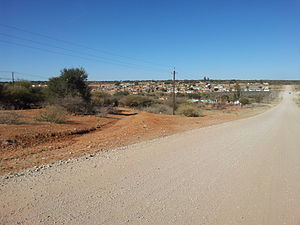Epukiro
| Epukiro | |
|---|---|
| Settlement | |

The Post 3 (Omauezonjanda) location within Epukiro.
|
|
| Location in Namibia | |
| Coordinates: 21°42′00″S 19°07′00″E / 21.70000°S 19.11667°E | |
| Country |
|
| Region | Omaheke Region |
| Constituency | Epukiro Constituency |
| Elevation | 4,793 ft (1,461 m) |
| Time zone | South African Standard Time (UTC+1) |
| Climate | BSh |
Epukiro is a cluster of small settlements in the remote eastern part of the Omaheke Region of Namibia, situated about 120 kilometres (75 mi) northeast of the regional capital Gobabis. The centre of the populated area is the Catholic mission station. Epukiro had about 3,200 inhabitants in 1997, predominantly ethnic Tswana.
Epukiro was since Namibian independence part of Otjinene Constituency. This constituency was split in 2004 and the new Epukiro Constituency was created.
The settlement was formed in 1902 when Roman Catholic Church bought the 30,000 ha farm Epukiro. Namesake of the farm and the settlement is the Epukiro River, an ephemeral river which cuts the farm from west to east.
A mission station was founded in 1904 by the Missionary Oblates of Mary Immaculate, a Catholic congregation. It was destroyed one year later during the Herero and Namaqua War. The German colonial administration opened a post office in 1905.
The Herero and Namaqua War of 1904–1907 saw tens of thousands of Ovaherero killed, almost its entire population. Survivors had lost their land and cattle, and the land originally in the hands of the Herero was now farmland in the possession of white settlers. When after World War I Germany lost all its colonies and South-West Africa became mandate territory of South Africa, the new administration was unable, perhaps unwilling, to undo the land transfer.
A South African administrator writes:
"Seeing that the whole Hereroland was confiscated by the Germans and cut up into farms and is now settled by Europeans it would be an impossible project ... to place them back on their tribal lands."
...
Wikipedia

